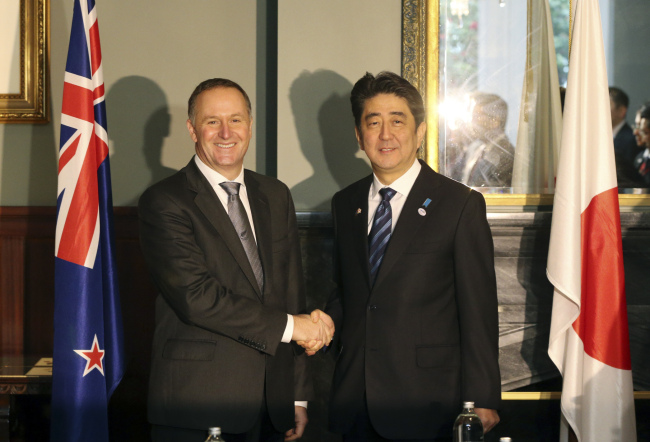AUCKLAND (AFP) ― The thorny issue of whaling dominated Japanese Premier Shinzo Abe’s whistlestop trip to New Zealand on Monday, with Prime Minister John Key saying they had agreed to disagree on the matter.
New Zealand and Australia hauled Japan before the International Court of Justice over its “scientific” whaling program in Antarctic waters, leading to the U.N. court ruling in April that it was a commercial venture and had no research value.
Abe has since signaled that Japan intends to look at ways it can resume the annual Southern Ocean hunt without breaching the ICJ ruling, setting up a potentially awkward meeting with Key on his one-day visit.
Key said Abe had confirmed the plan to resume whaling and the New Zealand leader reiterated his position that he wanted the harpooning to stop.
New Zealand and Australia hauled Japan before the International Court of Justice over its “scientific” whaling program in Antarctic waters, leading to the U.N. court ruling in April that it was a commercial venture and had no research value.
Abe has since signaled that Japan intends to look at ways it can resume the annual Southern Ocean hunt without breaching the ICJ ruling, setting up a potentially awkward meeting with Key on his one-day visit.
Key said Abe had confirmed the plan to resume whaling and the New Zealand leader reiterated his position that he wanted the harpooning to stop.

“The prime minister (Abe) did make it clear that they are looking at what sort of whaling program, in theory, could be conducted that fits within the rules,” Key said.
“He was very clear to say that Japan will abide by the ICJ decision but it’s also fair to say that there’s a difference of opinion. New Zealand would certainly prefer to see the end of all whaling.”
Key said the issue would not damage the bilateral relationship but New Zealand would be closely watching any Japanese attempt to revive the hunt
Earlier, he told commercial radio that “it would be very disappointing” if whaling resumed.
Tokyo called off its 2014-15 Antarctic season after the ICJ’s decision, and said it would redesign the mission to make it more scientific.
The whaling issue overshadowed trade talks designed to shore up the Trans-Pacific Partnership, an ambitious plan for free trade deal encompassing 12 nations, including Japan and New Zealand.
Abe also traveled to Christchurch, where he paid tribute to the 28 Japanese students killed in a devastating earthquake in 2011.
He laid a wreath at the site of the CTV building, which housed the English language school the students were attending, which collapsed and burst into flames in the disaster, claiming 115 lives.
Abe also visited the South Island city’s “cardboard cathedral,” designed by award-winning Japanese architect Shigeru Ban.
The structure, which is a temporary replacement for the 1881 Anglican cathedral destroyed in the quake, is an A-frame building constructed with weather-proofed cardboard tubes.
The Japanese leader then left for Australia on the next leg of a swing through the Pacific that will also include Papua New Guinea.
-
Articles by Korea Herald








![[KH Explains] Hyundai's full hybrid edge to pay off amid slow transition to pure EVs](http://res.heraldm.com/phpwas/restmb_idxmake.php?idx=644&simg=/content/image/2024/04/18/20240418050645_0.jpg&u=20240419100350)







![[From the Scene] Monks, Buddhists hail return of remains of Buddhas](http://res.heraldm.com/phpwas/restmb_idxmake.php?idx=652&simg=/content/image/2024/04/19/20240419050617_0.jpg&u=20240419175937)

![[KH Explains] Hyundai's full hybrid edge to pay off amid slow transition to pure EVs](http://res.heraldm.com/phpwas/restmb_idxmake.php?idx=652&simg=/content/image/2024/04/18/20240418050645_0.jpg&u=20240419100350)

![[Today’s K-pop] Illit drops debut single remix](http://res.heraldm.com/phpwas/restmb_idxmake.php?idx=642&simg=/content/image/2024/04/19/20240419050612_0.jpg&u=)